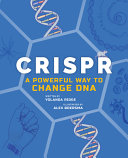2018 School Spending Survey Report
CRISPR: A Powerful Way To Change DNA
Annick.
Sept. 2020.
116p.
Tr $24.95. ISBN 9781773214245.
COPY ISBN
VERDICT A relevant, evidence-based resource for high school students and academic library collections. Ridge successfully demonstrates the necessity of an educated debate about the nuanced pros and cons of gene modification.
RELATED
ALREADY A SUBSCRIBER? LOG IN
We are currently offering this content for free. Sign up now to activate your personal profile, where you can save articles for future viewing





Be the first reader to comment.
Comment Policy:
Comment should not be empty !!!